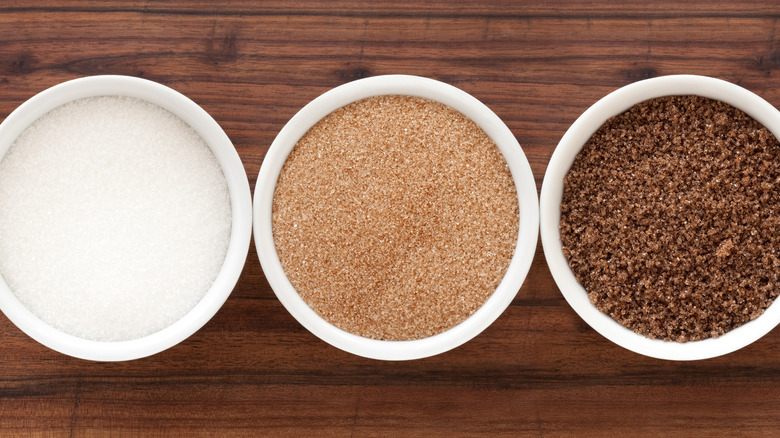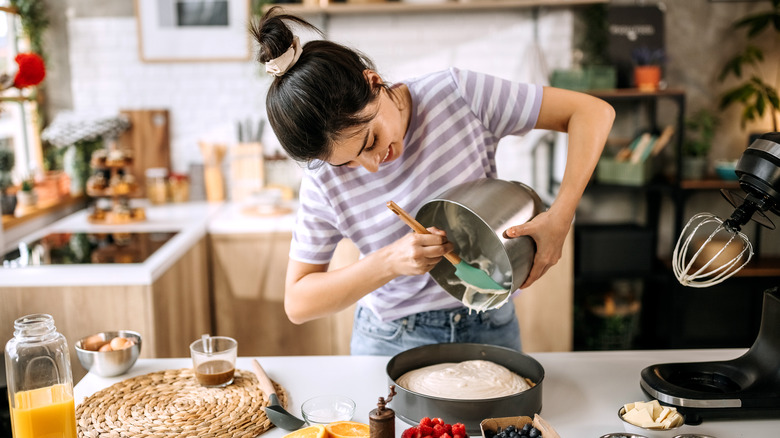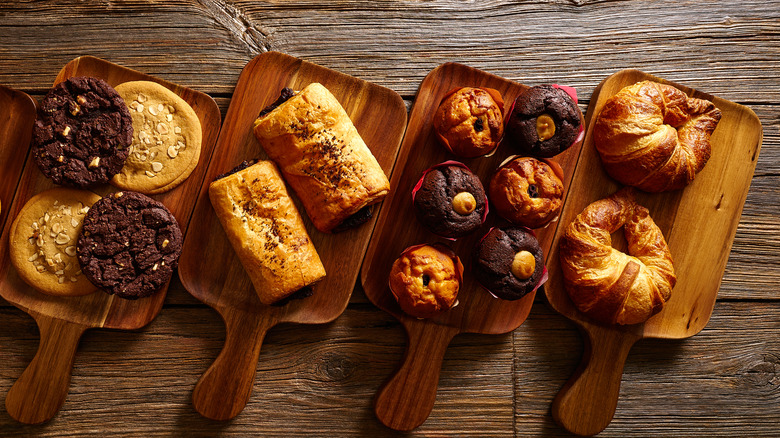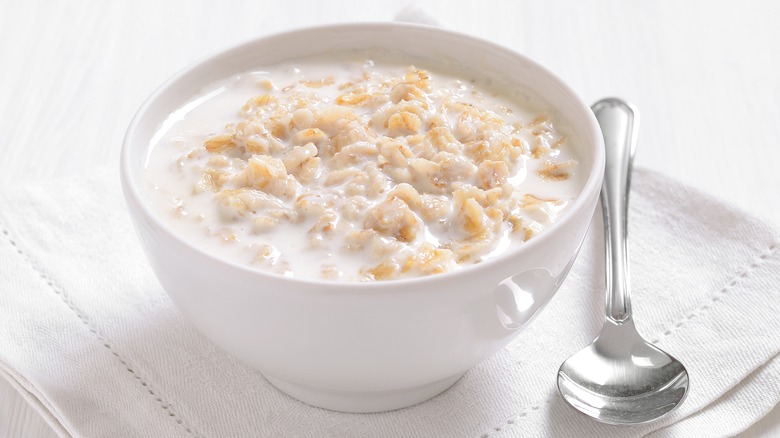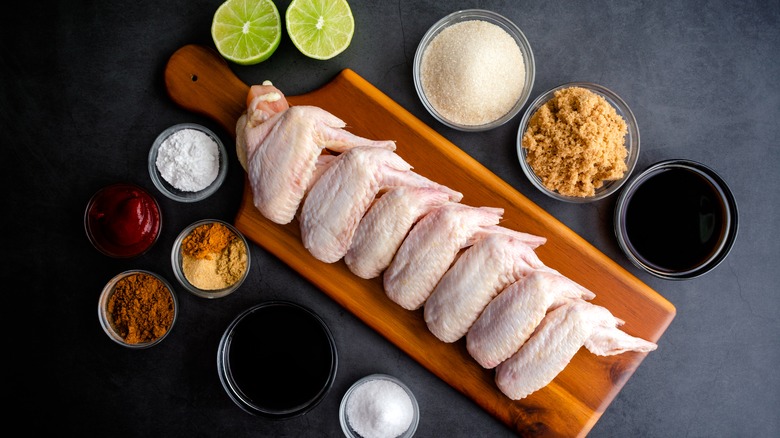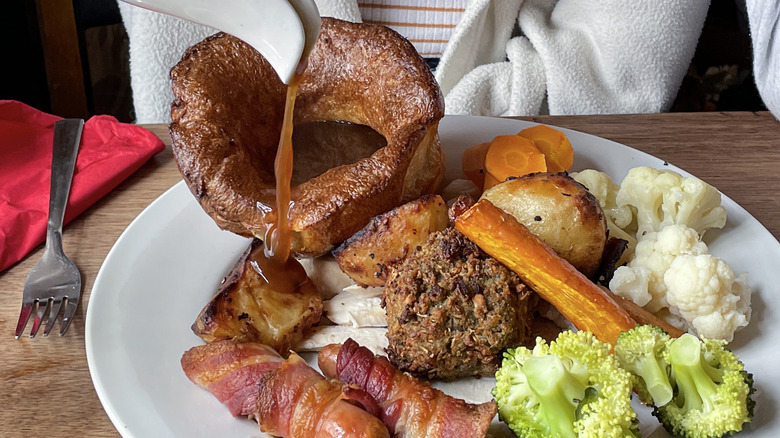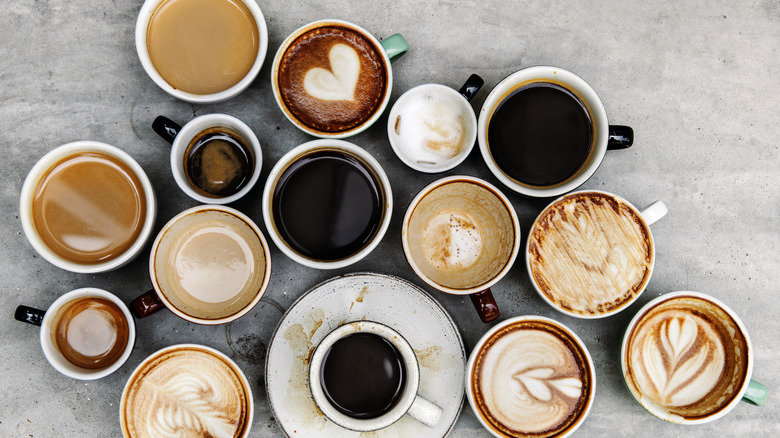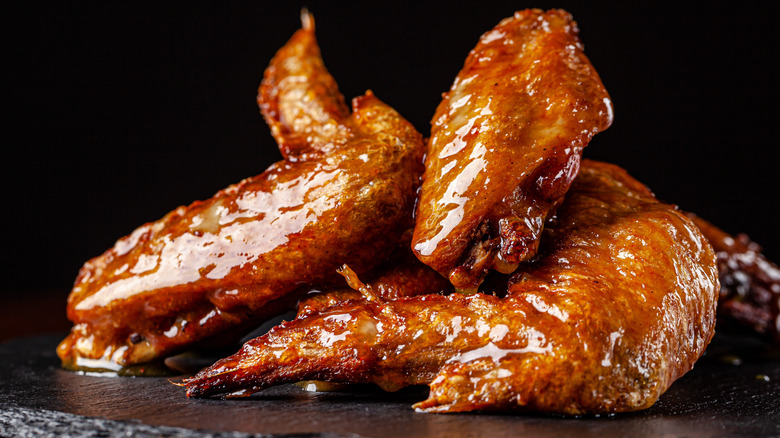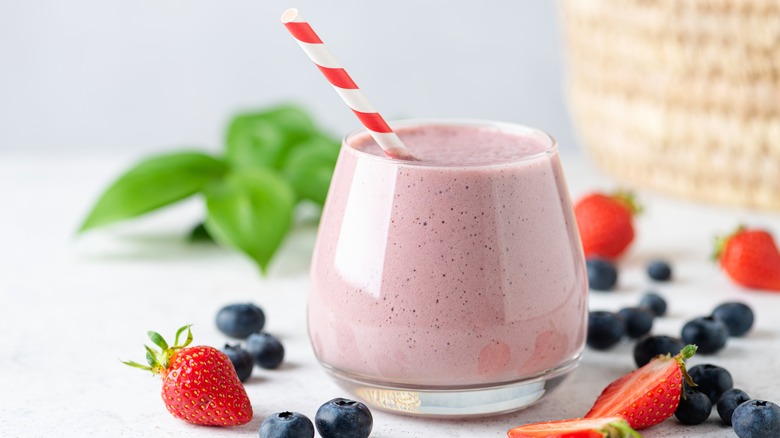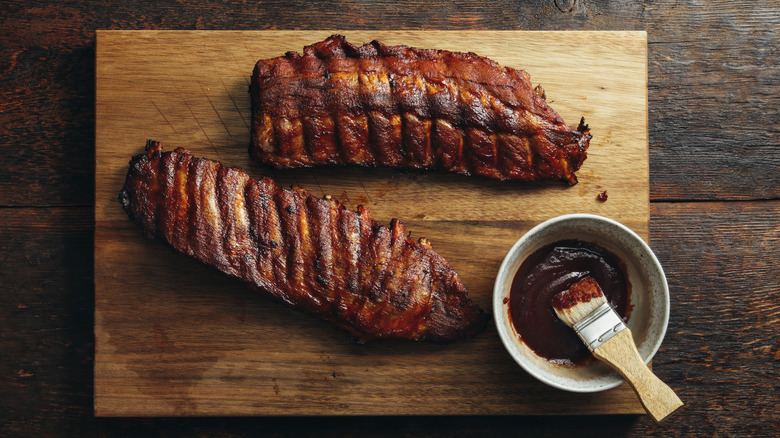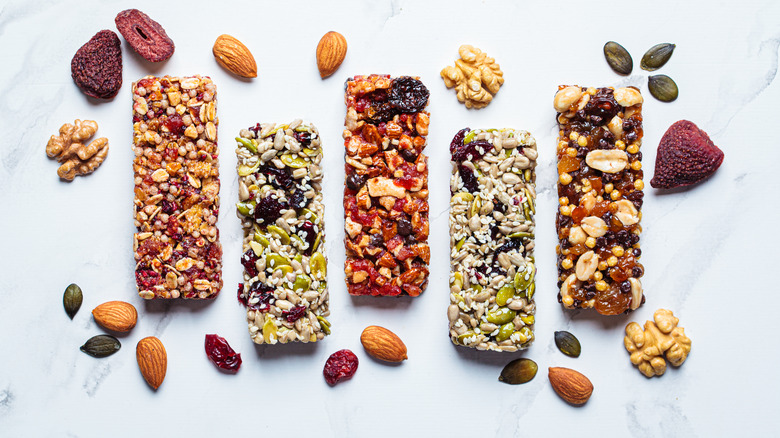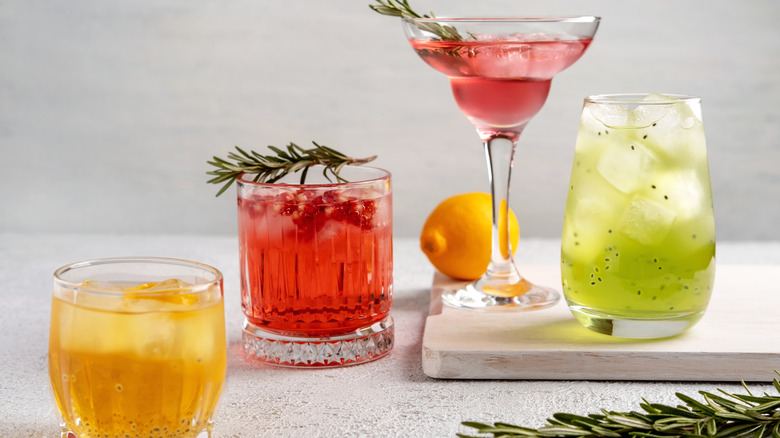The Best Brown Sugar Substitutes For Every Occasion
Brown sugar is a must-have in most kitchens. Its rich flavor and unique color make it an excellent option for many recipes — cakes, barbecue sauces, bread, glazes, granola, cookies, and oatmeal.
Brown sugar is made by mixing white sugar and molasses. The color — dark or light brown — is determined by the amount of molasses added to the white sugar. Light brown sugar has 3.5% molasses by weight, while the darker one has 6.5% (per the University of Illinois Extension). Typically, baking recipes that call for brown sugar imply the light version. Its darker counterpart does a good job when used in barbecue sauce, oatmeal topping, and granola, to mention a few.
But what happens when you run out of brown sugar unexpectedly? You don't have to panic. There are many brown sugar alternatives — you might already have some in your pantry — that would do an excellent job as brown sugar in any recipe. We're highlighting 11 substitutes and every occasion where they'll be ideal.
Best for baking cakes
Honey is a great brown sugar substitute when baking cakes because it blends perfectly with the other ingredients and is pleasantly sweet. Honey can be up to three times sweeter than brown sugar, which translates to 1/2 to 2/3 cup of honey for recipes that call for a cup of brown sugar. And since it's liquid — containing roughly 20% water — while brown sugar is solid, you'd want to reduce the amount of liquids in your recipe, typically by 1/4 cup for every cup of honey used. Further, unlike brown sugar, honey burns faster. For that reason, reduce the oven temperature by 25 degrees Fahrenheit.
You'll also want to increase the amount of baking soda used to neutralize the acidity of honey. For every cup of honey, add 1/4 teaspoon of baking soda. That said, the most important thing when using honey in baking is striking a balance. So don't use too much lest your cake becomes heavier than usual and also more sticky.
Another brown sugar substitute for baking cakes is white sugar. The substitution ratio is 1:1. The cake will retain the same sweetness as brown sugar. However, it will be drier because white sugar is not moist like brown sugar. You'll also get a more aerated cake. Coconut sugar is yet another excellent substitute because it looks like brown sugar and has a caramel-like taste, almost the same as brown sugar. When using coconut sugar, use the same amount as brown sugar.
Best for baking cookies and bread
Date sugar is typically not sugar, though it's an excellent alternative for brown sugar when baking artisan bread, zucchini bread, banana bread, or cookies. Date sugar is made by drying and then grounding dates. They are super nutritious — and exceptionally high in fiber. This natural whole food barely dissolves in liquids. It's also coarse in texture, making it ideal for baking recipes that don't need to be smooth and soft. When substituting for brown sugar, use 2⁄3 to 1 cup for every cup of brown sugar the recipe calls for.
Given its high fiber content, you'll need more liquid for perfect consistency, which translates to increasing the liquids (milk, eggs, or water) in your baking or decreasing the dry ingredients. And so here, that would be flour. The good news, however, is that date sugar has a hint of caramel flavor. Hence, your baked goods will taste almost the same as when using brown sugar.
Now, this is important. Date sugar has a low glycemic index of 55, while brown sugar is on the higher side with a glycemic index of 70 (via Freedom of Health). Although packed with energy, date sugar doesn't rapidly increase your blood sugar.
Best for oatmeal recipes
Whether you prefer overnight or traditional oatmeal, maple syrup, honey, date sugar, and muscovado sugar should be your go-to replacements. The substitution ratio will depend on which of these substitutes you've chosen.
Muscovado sugar has a higher molasses concentration than brown sugar, as it's mildly refined. When using it in cereals, substitute brown sugar with the same amount of muscovado sugar — it injects a hint of molasses flavor and a darker brown color. You'll also tap into the magnesium, iron, calcium, potassium, and antioxidants found in molasses. Honey equally makes a good substitute for brown sugar in this case. Drizzle honey on your cereal for a nice fruity flavor. And since honey is sweeter than brown sugar, you'd want to reduce the amount to 1/2 or 2/3 of the amount of brown sugar called for in the recipe.
Date sugar makes one of the best brown sugar substitutes in oatmeal recipes since it absorbs more liquid than brown sugar, giving your bowl of oatmeal just the right thickness. Substitute the amount of brown sugar called for in the recipe with 2/3 of date sugar. Finally, you can use maple syrup — like date sugar, replace the amount of brown sugar required in the recipe with 2/3 maple syrup.
Best for marinades
When done right, marination tenderizes and amps the taste of beef, poultry, and fish. And what better way to add flavor to your recipe than try a new ingredient, muscovado sugar, instead of brown sugar? Muscovado sugar has a rich toffee-like flavor that gives your marinade a smoky undertone.
It's the least processed sugar, made by heating sugar cane extract for the liquid to evaporate. The grains that remain from this process are known as muscovado sugar. It's rich in molasses and more granular than brown sugar. It makes a great addition to your marinades because of its moisture content, stickiness, and darker shade of brown.
Just like when using brown sugar, mix the muscovado sugar with your favorite spices and herbs, olive oil, and acids like vinegar, wine, or lemon juice. Then soak your meat, fish, or poultry into the marinade before letting it sit in the fridge for six to 24 hours for the flavors to infuse.
Best for dressings
Liquid sweeteners, honey and maple syrup, can stand in for brown sugar without compromising your dressings' taste or consistency. How much you stretch these two dressing bases depends on the flavor and viscosity you want.
Honey is perfect when you want to neutralize the acidity of vinegar while infusing some floral-fruity aroma. Simply mix honey, olive oil, and apple cider vinegar for a sweet yet savory dressing. And since honey is 20% water, you want to reduce the amount of other liquids in the dressing by 1/4 cup for every cup of honey used. The ratio of the other ingredients is also important to ensure a perfect mix.
You can also resort to maple syrup for a delightful dressing. The most straightforward recipe would be replacing the honey with maple syrup. In this case, you'll substitute the quantity of brown sugar mentioned in the recipe with the same amount of maple syrup. And like when using honey, reduce the amount of other liquids. But don't let our simplicity hold you back — mix in mayonnaise, soy sauce, and even Dijon mustard for a creamy dressing with a touch of umami flavor.
Best for hot beverages
Muscovado sugar, raw sugar, and honey are excellent brown sugar substitutes for hot beverages like tea and coffee. Muscovado sugar adds a caramel-like flavor to your beverage and gives it a darker color, which makes it more ideal for black tea rather than white or herbal tea. And because it's a coarser sugar, muscovado is more suitable for hot beverages than iced ones. Hence, it takes ages to dissolve in liquids — okay, maybe not ages, but you get the point! Thus, even when using it in hot tea or coffee, take your time stirring this sugar to dissolve completely. Otherwise, it will settle at the bottom of the cup. Use the same amount of muscovado sugar as you would brown sugar.
Raw sugar is also called turbinado. It's processed through several stages to remove considerable amounts of molasses and give it a golden brown color. Its crystals are larger than other sugars. When traded for brown sugar, the substitution ratio is 1:1. Raw sugar has a subtle caramel flavor.
Honey makes an excellent alternative to brown sugar. However, since it's sweeter than brown sugar, you'd want to reduce the amount used to 2 teaspoons if you usually use 3 teaspoons of brown sugar in your hot beverages, for example.
Best for glaze
Honey, maple syrup, and agave nectar are ideal brown sugar substitutes for making glazes because they are liquid. For every cup of brown sugar called for in a recipe, use 2/3 of either of these liquid sweeteners. Given their water content, reduce the amount of oil, water, juice, or milk in the recipe to offset the glaze. Ideally, you should reduce the liquid content by 1/4 cup for every cup of the liquid sweeteners (per Healthline). Also, reduce the simmering time as they burn faster than brown sugar.
Agave nectar or syrup is processed from agave plants. It has risen to fame recently because of its very low glycemic index ranging from 10 to 19. Honey is yet another excellent trade-off for brown sugar in glazes. It fits perfectly in the brown sugar bill because of its moisture content and sweetness.
On the flip side, maple syrup is made from maple tree sap, which is collected, heated, evaporated, and the impurities removed. Usually, the color of maple syrup depends on the season of the year it was extracted. In the same breath, be wary of maple syrup imitations made from artificial flavors and corn syrup. According to Maple from Canada, when using maple syrup instead of brown sugar, use the same amount as required for brown sugar.
Best for smoothies
Honey and date sugar are two brown sugar alternatives you can't go wrong with when making smoothies. One, because they are natural sweeteners, and two, their nutritional content is impressive.
How much you use depends on how much sweetness you want to inject into your concoction. But ideally, use the same amount as you would brown sugar. And since date sugar absorbs more liquid than brown sugar, it's best to increase the amount of liquid in your smoothie to ensure the same consistency as when using brown sugar. Date sugar has the same nutritional value as whole date fruits — using it in your smoothie adds potassium, vitamins, antioxidants, fiber, and minerals to your already nutrient-packed beverage.
Similarly, honey adds ample sweetness to the bitterest of smoothies. A spoonful or two does the magic whenever a recipe calls for three to four spoonfuls of brown sugar. This golden liquid is bursting with incredible amounts of antioxidants. It's also rich in minerals and helps with muscle repair (via the journal Nutrients).
Best for barbecue sauce
Up to this point, you might have noticed that liquid sweeteners pair well with liquid recipes. And so it goes without saying that honey, agave nectar, and maple syrup are ideal for barbecue sauce when you run out of brown sugar. Apart from the liquid sweeteners, muscovado sugar is also a great option.
Use the same amount of muscovado sugar as the amount of brown sugar called for in the recipe. But expect a darker sauce with a rich earthy flavor. Besides its robust flavor, muscovado is bursting with minerals (potassium manganese, calcium, and magnesium) and antioxidants. You can also wipe a sweet barbecue sauce using honey — it neutralizes the sourness of vinegar and lemon juice. Spin your barbecue sauce however you see fit by adding ingredients of your choice; brewed espresso, Dijon mustard, ketchup, whole-grain mustard, and of course, oil and salt. For every cup of brown sugar the recipe calls for, you know the drill, use 1/2 to 2/3 cup of honey.
Maple syrup makes a barbecue sauce with a distinctive flavor. Substitute brown sugar with the same amount of maple syrup. Add lemon juice, ketchup, minced garlic, kosher salt, Worcestershire sauce, and chopped onion. Agave nectar is yet another substitute that you can use in place of brown sugar. Like its counterparts, you can opt for a sweet or spicy sauce.
Best for granola bars
When it comes to granola bars, you want to use ingredients with the highest energy without compromising taste. And the best part is that there are so many options, whether it's grains, nuts, dried fruits, salt, or sweeteners. For sweeteners, brown sugar takes center stage. It also acts as a binder.
However, several alternatives will give you the same result — muscovado sugar, raw sugar, honey, maple syrup, agave nectar, coconut palm sugar, stevia, and monk sugar. You can substitute brown sugar with one or a combination of these sweeteners. Muscovado and raw sugar are worthy alternatives to brown sugar because of their high moisture content. They are also excellent binders. The substitution ratio is 1:1. Honey, maple syrup, and agave nectar also sweeten your granola bar and help hold all the ingredients together. The only downside is that your granola bar won't be as crunchy as when using solid sweeteners. Substitute the required amount of brown sugar with 2/3 of these liquid sweeteners.
You can also substitute coconut palm sugar for brown sugar — use the same amount of coconut sugar as brown sugar. Also, stevia makes a healthy alternative to brown sugar as it's calorie-free — but use stevia sparingly instead of brown sugar, as it's 250 to 300 times sweeter. Monk fruit is also incredibly sweet — so you'll only need a pinch. For the last two alternatives, you'll have to make up for the flavor, the glue that binds the ingredients together, and the crunchiness with other ingredients.
Best for cocktails
There are a dozen brown sugar substitutes for making simple syrup for cocktails. Coconut sugar, honey, maple syrup, and agave nectar come to mind. Although equally or even more sweet than brown sugar, these substitutes change the color and flavor of your cocktail, which is not bad given their distinct, rich flavors and nutritional value.
Honey is dense, hence doesn't dissolve in cold drinks — honey syrup is the way to go. While brown sugar syrup mixes 2 cups of brown sugar and 1 1/3 cup of water, honey syrup achieves the best consistency with 2 parts honey and 1 part water. Depending on the shade of the honey, you'd want to pair it with either darker or lighter drinks. Maple syrup is the perfect sweetener in margaritas and Old Fashioned cocktails — use a 1:1 ratio when substituting it for brown sugar.
Coconut sugar is another alternative to brown sugar. It gives your cocktails a smoky flavor. To use it, you must first make coconut syrup. You'll mix 2 parts coconut sugar and 1 part water. Use the same amount as you would brown sugar syrup. Coconut sugar syrup is ideal for darker spirits. Next, agave nectar — because it's made from the same plant as tequila, it's obviously an excellent sweetener for this spirit. It also pairs well with cocktails that have lemon. And since it's sweeter than brown sugar, use 2/3 for every cup of brown sugar called for in the recipe.

